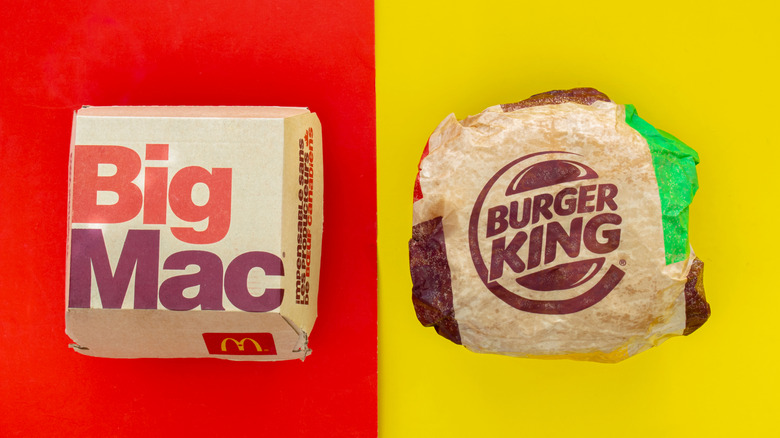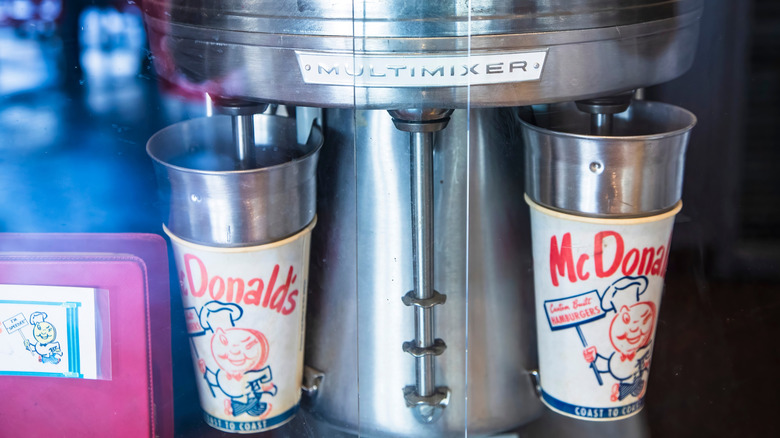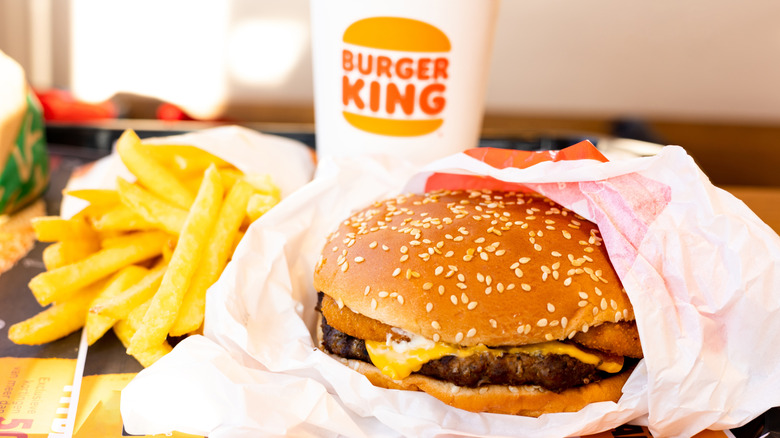McDonald's Or Burger King: Which Iconic Chain Opened First?
When it comes to fast food burger chains, diners definitely have opinions about which are the best and which are the worst. Love them or hate them, two long-running chains stand out among the most recognizable quick-bite brands: McDonald's and Burger King. For many people, memory doesn't stretch back to a time when either restaurant existed — it seems they've always been part of American and global food culture. But, of course, there was a time when the world knew neither the Golden Arches nor BK. Between the two famous burger chains, which debuted first?
The answer is McDonald's — though the branding of the restaurant as we know it today, complete with a golden-arched sign, didn't originate until the 1950s. But the very first food establishment formed by the McDonald's brothers under the name "McDonald's" opened its doors in 1940 in San Bernardino, California. This dining spot paved the way for the widespread global chain as it exists now. Burger King lagged behind by 14 years, officially launching in 1954.
McDonald's debut marked the birth of a burger revolution
McDonald's, in its current form — with over 40,000 locations around the world, slings its best-selling french fries and hamburgers by the millions every single day, quick-service style. The original restaurant, known as McDonald's Bar-B-Q, wasn't quite so speedy, serving slow-cooked, hickory-smoked barbecue from a traditional pit. The original eating spot's approach was a carhop format without any indoor customer seating.
However, brothers Dick and Mac McDonald noticed their best-selling item was, by far, hamburgers, accounting for 80% of food sales. Because of this, the two closed down briefly to redesign their restaurant and operating process, settling on a speedier self-service model, thus changing fast food forever.
Inventing what they called the Speedee Service System, the McDonald brothers implemented direct customer ordering at self-service windows, eliminating the need for carhops and waiters. Replacing reusable dinnerware with disposable utensils and containers eradicated the need for dishwashers. The menu was also pared down, with the star attraction being a 15-cent hamburger.
A milkshake machine distributor named Ray Kroc met the McDonald brothers in 1954, curious as to why one location had eight of his milkshake machines — though he quickly learned it was necessary due to the brothers' business model. Intrigued and seeing enormous potential, Kroc purchased the franchising rights to spread McDonald's across the U.S., opening his first McDonald's franchise in Illinois in 1955. He ultimately purchased the company outright from the brothers in 1961. The rest, as they say, is fast food history.
Burger King reigns for more than 70 years and counting
Burger King, with its iconic Whopper sandwich, officially launched in 1954 in Miami, Florida, by James McLamore and David Edgerton. However, the brand's origins are reported to have started just a wee bit earlier than that, debuting under the name Insta-Burger King in Jacksonville, Florida, in 1953, with Keith Kramer and Matthew Burns at the helm. McLamore and Edgerton were just franchisees then, opening their first branch of the brand in 1954. They acquired the full company in 1959, though, and the "Insta" part of the name was dropped. Though the two ultimately sold out to The Pillsbury Company in 1967, they transformed the chain into the brand as the world knows it now. The pair is also credited with creating the Whopper and pioneering the flame-broiled burger concept that Burger King still uses.
Like many other fast-food restaurants in those early days, Burger King took its service cues from dominating rival McDonald's. BK is credited with being the first to implement indoor dining areas as part of the quick-service approach, as Mickey D's strictly operated a drive-in model without inside customer seating until 1963.
As of April 2025, Burger King has nearly 20,000 worldwide locations. The chain is currently owned by Restaurant Brands International Inc., which also owns the Tim Hortons, Popeyes, and Firehouse Subs restaurant brands.



